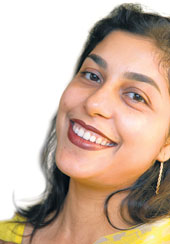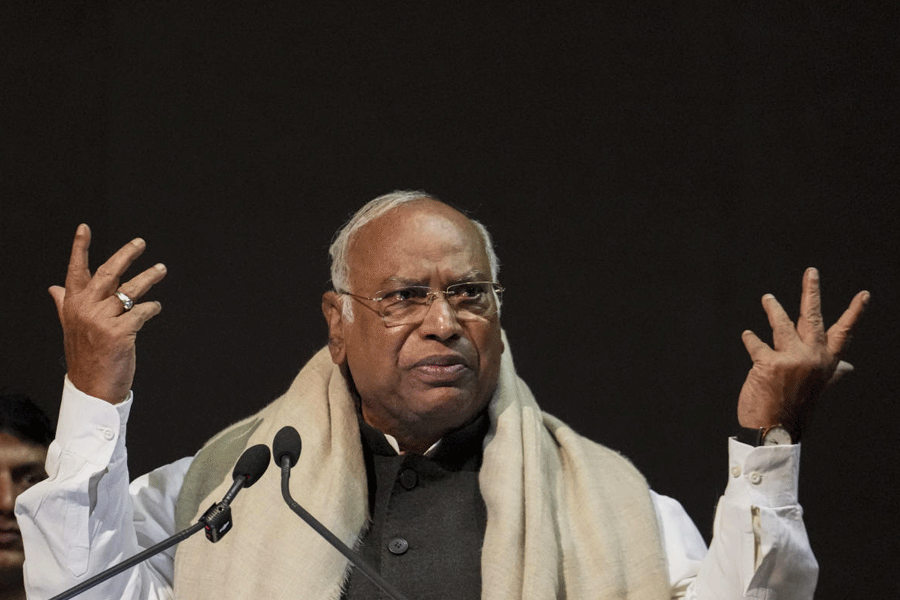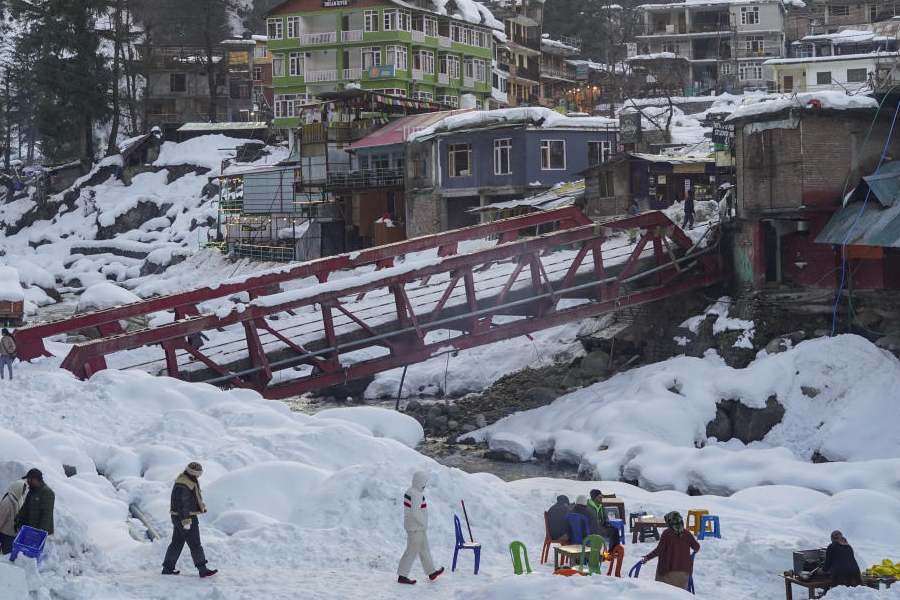 |
| Sangita Bandyopadhyay ‘Panty’ “I was lying in bed...when I felt a familiar discomfort in my abdomen...I went to the bathroom to check and as I thought...I had started my period...my panty was drenched in blood...blood was trickling down my thighs...I remembered that I didn’t have any pads...nor did I remember to pack any panties into my bag...so the only panty I had was the one I was wearing...at this time of the night, would any shops be open?...I went to the balcony...yes, I could see a medical shop in the distance... What am I supposed to do about the panty? I can’t possibly sleep with this one on. I won’t be able to sleep at all. And the thought of sticking a clean pad into this blood-drenched panty...It is then that I remembered about the panty which I found...but it is a used panty...someone else’s... |
It was one of those literary evenings and at the centre of the discussion was author Shobhaa De. Suddenly, editor Anita Roy turned to her and said: “You are completely shameless, aren’t you, Shobhaa?” Shobhaa De smiled. “Yes,” she replied, with considerable pride.
There was a time when shamelessness had a different connotation — tied as it was to the dark word, shame. Now there is a minor revolution brewing in India’s own backyard. Women are writing about sex — openly and exultantly — and pushing men to the sidelines.
“I don’t see such exciting changes in men’s writings — men write appallingly about sex,” says Roy, currently working on an anthology of writings of women under 40 for publisher Zubaan. “But there is a generation of women writing with greater freedom and subjects and forms. Women are experimenting with language, genre and content.”
A school of thought has always believed that there is no entity called a woman writer — it holds that there are writers, male or female. But as Arpita Das, co-founder of the New Delhi-based Yoda Press with Payal Sharma, stresses, there is, indeed, a difference. “Women are cutting-edge bold, whereas men are wary of rocking the boat,” she says. “Men don’t find the need to write about sex, whereas women need to investigate their own existence.”
 |
| Taslima Nasreen ‘The Game in Reverse’ The other day, at Romna Park, I saw a man buying a girl for a few bucks I have this terrible urge to buy a man...for 5/10 bucks A boy with a clean-shaven chin and a cute ass I’ll pull him up by the collar onto my rickshaw and take him home Where I’ll tickle him all over and Slap the hell out of him with my high-heeled slippers And when I’m done with him, “Up boy, get out here” In the morning, they'll be sitting by the road, all bruised and battered Ripe boys with a chest full of hair |
Of course, as the writings of De — author of such books as Starry Nights, Strange Obsession and Uncertain Liaisons — underscore, women have often written about sex. Way back in 1941, Ismat Chugtai penned a story called Lihaf (The Quilt). Three years later, she was charged with obscenity for her book which had a lesbian theme.
There have been, for long, books by women which have dealt with sexuality. But the trend, once at best an erratic trickle, is now a veritable stream. Women authors in English, Hindi, Bengali and other regional languages are writing about sex with an openness that’s as fresh as it’s candid.
Take Sangita Bandyopadhyay’s novel, Panty, which created a furore among Bengali readers in recent months. The story revolved around a woman who moves into a flat in Calcutta to find an abandoned panty in a corner of a cupboard. She picks it up and finds that though it is “soft, sensuous and obviously imported,” it is “musty and stained”. The protagonist wonders about the woman who wore it. “A panty like that — with the soft material and the leopard print...it could only belong to a wild woman...a woman who must have been very sexual...it must be the stained panty of a sexually wild woman...” And then she pauses — the pause foreshadowing the protagonist’s own secret sexual self— and asks, “But how wild could she be? Is she wilder than me or less wild?”
Sex is no longer all about whispers and innuendo. On the contrary, both authors and publishers stress, sex is now being celebrated. “Women once wrote about the oppressive nature of sex. Now, they are also writing about its pleasurable side. They are saying: it’s okay to enjoy sex,” says Roy .
 |
| Mallika Sengupta ‘The Three of Us and the Sea’ Three of us stepped into the sea But salt and sand and murky water assaulted me Penetrating the folds in my sari, entering me The waves threw me to the ground, forced me down The rapist sea With sperms of sand forcing their way in |
Social norms are changing — a reason why more and more women are writing about subjects once seen as taboo. But, as Sangita Bandyopadhyay points out, women’s writings on sex still evoke criticism. “When I wrote Sankhini (serialised in the Bengali magazine, Desh, and later published as a novel), it really created a stir. While many people praised me, I also received a lot of criticism. I had talked openly about orgasms — one of my woman characters says, ‘I can feel it’ — and people told me, ‘How can you be so open? There are some things that you can’t be so open about.’ But I don’t think you have much control over what you write. It flows.”
In some quarters, clearly, there is still a certain nervousness about women writing on sex. “We are so hypocritical about sex in this country — we pretend it doesn’t exist,” says Zubaan founder Urvashi Butalia.
Not surprisingly, Bengali writer Mallika Sengupta faced hostile questions when she first started writing about sex over 15 years ago. “But negative reactions have never deterred me from writing about sex. Sexuality is a very vital experience of life. You need to tackle it honestly in literature,” she says.
There are a great many other writers — quite a few of them young women — who are doing just that. Sex figures prominently in Abha Dawesar’s The Three of Us, and a young writer called Priya Chhabra gives a vivid description of a sexual encounter between Marco Polo and a courtesan as seen by a gecko on the wall in a book to be published by Zubaan next year. There is Kiran Desai, and then there is Diana Romany in a short story called A Spoonful of Grain which deals with two men picking up women for sex and goes on to describe the sexual act. “It’s chilling and disturbing sex,” says Roy .
Like Romany’s short story, many of the contributions in the new book 21 under 40 — to be published in February — deal with sex. Zubaan is also working on a compilation of women narratives on sex. In a book published this summer by Yoda Press, Maya Sharma looks at working class lesbian lives. “We are doing a lot of books on sexuality,” says Das. “These are exciting times, for the phenomenon is now a part of the market.”
 |
| Write choice: Abha Dawesar |
Writers, indeed, have no dearth of publishers, for there is a growth in Indian independent publishing houses, as well as a greater presence in India of international groups. “Everybody is on the look-out for mass-market books, books that sell,” says Butalia.
Clearly, the quest for new books is giving a new boost to authors — especially women who are dealing with different genres. And for many young women sex is as integral to their writings as to life. “It is important for women to write about sex and sexuality because literature is never complete without women’s perspective. In literature, we get mostly a male perspective as far as the issue of sex is concerned, though that could be because there have been more men writers than women,” says Sengupta.
But, then, as writer Aniruddha Bahal would agree, the bad sex writing award has also been going to men.
‘If a woman does it, they call it porn
Taslima Nasreen talks to Dola Mitra
In literature, men have always written about sex. They have established themselves as the gender with the rights over this topic. They have considered it their domain to talk about sex, to express their desires and fantasies. They have objectified women’s bodies to the extent of reducing it to bits and pieces — breasts, cleavage, vagina. They have practically been raping women with words throughout the history of literature.
And then they shout, ‘Obscene, obscene’ when a woman writes about her own body, about her desires and fantasies. They call it pornography, when a woman does it.
Why do they do this? Because it threatens them. It challenges their ideas about themselves as the active gender. It prevents them from reducing a woman to playing the passive role of a ‘sex object’.
But they can’t stop me.











